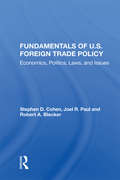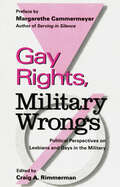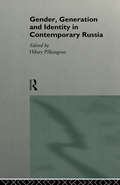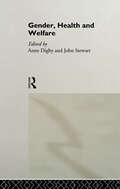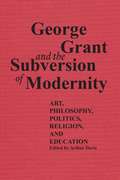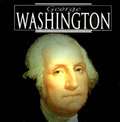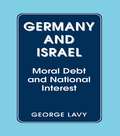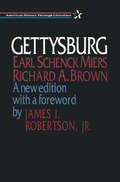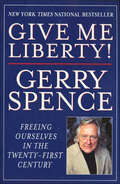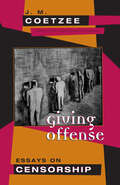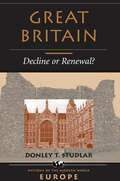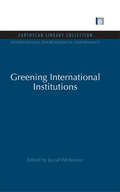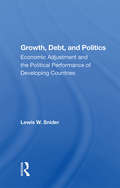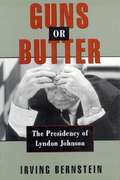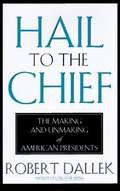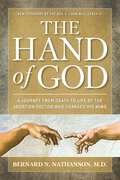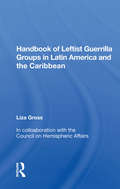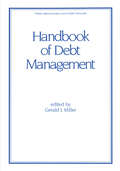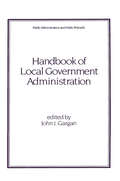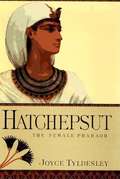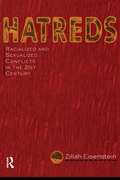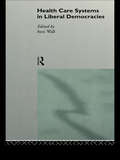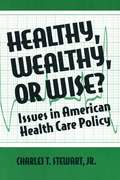- Table View
- List View
Fundamentals Of U.s. Foreign Trade Policy: Economics, Politics, Laws, And Issues
by Stephen D. CohenThis unique text integrates for the first time the three critical aspects of U.S. foreign trade policy formulation and implementation: economics, politics, and laws. In a comprehensive and nonjudgmental manner, a political scientist, an economist, and a legal scholar combine efforts to present a well-rounded view of the nature and impact of trade p
Gay Rights, Military Wrongs: Political Perspectives on Lesbians and Gays in the Military (History Reference Ser.)
by Craig A. RimmermanFirst Published in 1996. Routledge is an imprint of Taylor & Francis, an informa company.
Gender, Generation and Identity in Contemporary Russia
by Hilary PilkingtonThis book explores the lives and expectations of young women in the new Russia, looking at the enormous changes that the new social and economic environment have brought. The authors draw on the growing literature on gender and generation in the West which has arisen as a result of the recognition that the experience of youth is classed, raced and gendered and that the experience of gender is mediated by class, race, ethnicity, sexuality and age. They consider the role of the media, state and social institutions in shaping opportunities and experiences in the post-Soviet environment, focusing on the strategies employed by individual women to reforge social identities in a society in which they have been dislocated more acutely than in any other `postmodern' society.
Gender, Health and Welfare
by Anne Digby John StewartGender, Health and Welfare deals primarily with the century before the creation of the classic welfare state in Britain. It provides a stimulating introduction to an historical era which saw a huge expansion in welfare services, both state and voluntary, and during which women emerged as significant 'consumers' and 'providers' of various measures.
George Grant and the Subversion of Modernity: Art, Philosophy, Religion, Politics and Education (The Royal Society of Canada Special Publications)
by Arthur DavisGeorge Grant's mystique as a public philosopher is due in part to the seemingly contradictory political stances he took through the years. His opposition to the Vietnam war and his linking of liberalism with technological progress and imperialism brought him favour among the political left during the 1960s. Then, in the following decade, his opposition to abortion earned him allies on the political right, despite his rejection of limitless capitalist growth and free trade with the US. This collection of original essays reveals the complex philosophic, artistic, and religious sources underlying Grant's public positions of nationalism, pacifism, and conservatism.The collection begins with Grant's previously unpublished writing on Céline. This is a bold and vigorous Grant, writing on a topic about which he is passionate and deeply informed. Grant's own work is followed by two pieces that explore his devotion to Céline, Nietzsche, Heidegger, Weil, and Strauss also receive special attention here. Many of the essays draw on manuscripts and notes left unpublished by Grant, thus contributing new perspectives to the ongoing discussion of his work.The focus of this book is the unknown George Grant, namely, the philosophic, religious, and artistic inspiration behind his well-known public positions. Here we discover the great modern thinkers who animated Grant, and whose writings occupied him for much of his life.
George Washington (Photo-illustrated Biographies Ser. #4)
by T. M. UselA short biography of George Washington, the Virginia farm boy who grew up to lead the American army in the Revolutionary War and become the first president of the United States. Pictures are described.
Germany and Israel: Moral Debt and National Interest
by George LavyIn 1952, the Federal Republic of West Germany concluded a treaty with Israel whereby the Germans had to pay three billion Deutschmarks in compensation for the Holocaust. However, the Israelis felt that Germany owed Israel a moral as well as a financial debt, and thus expected further aid and protection. Although Germany made several concessions in favour of the Jewish State, particularly in the domain of armament, as Germany's political status increased, its national interest gradually took priority over that of Israel. This book examines the grounds which motivated Germany to grant aid to Israel and the change in their relations as the German economy flourished and gained influence in world affairs.
Gettysburg: A New Edition With A Foreword By James I. Robertson, Jr (Civil War Paintings Ser. #2)
by Richard A. Brown Earl Schenck Miers James L. Robertson JrOriginally published in 1948, this book tells the story of the three fateful days of Gettysburg in the words of the men and women who lived it. No mere chronicle of troop movements and military decisions, it is a path-breaking work in the reporting of Civil War history. Praised by "The New York Times Book Review" as "the very best collection of firsthand accounts, written by soldiers and civilians" of the battle of Gettysburg, this volume has been out of print for many years. Edited by Earl Schenk Miers (1910-1972), one of the pioneers in reviving popular interest in the American Civil War and in Lincoln, this new edition is enriched with a foreword by noted Civil War scholar James I. Robertson, Jr. For many years a favourite among Civil War buffs and enthusiasts, this edition is ideally suited for use in American history courses on the Civil War and military history and in American history survey courses.
Give Me Liberty!: Freeing Ourselves in the Twenty-First Century
by Gerry SpenceHere, in this landmark personal work, Gerry demonstrates how, despite the democratic rhetoric we hear and believe, we have become enslaved. All of us are trapped by a complex web of corporate and governmental behemoths he calls the "New Slave Master" that today controls our airways, educates our children, and manages every facet of our lives.Yet, far from being a pronouncement of gloom, Give Me Liberty! is an inspiring and visionary work. In the spirit of his bestselling How to Argue and Win Every Time, Spence expounds on his philosophy, thus empowering us to:Liberate the slave within, redefine success, unchain the spirit, escape the religions of work and beliefs that enslave us, free ourselves with what he calls our "magical weapon."Like Thomas Paine's Common Sense, Give Me Liberty! captures the underlying malaise of a country, transforming it into a national dialogue that promises a groundswell for a meaningful democracy in America in the coming years.
Giving Offense: Essays on Censorship
by J. M. CoetzeeJ.M. Coetzee presents a coherent, unorthodox analysis of censorship from the perspective of one who has lived and worked under its shadow. The essays collected here attempt to understand the passion that plays itself out in acts of silencing and censoring. He argues that a destructive dynamic of belligerence and escalation tends to overtake the rivals in any field ruled by censorship.
Giving Offense: Essays on Censorship
by J.M. CoetzeeWinner of the 2003 Nobel Prize in Literature. J. M. Coetzee presents a coherent, unorthodox analysis of censorship from the perspective of one who has lived and worked under its shadow. The essays collected here attempt to understand the passion that plays itself out in acts of silencing and censoring. He argues that a destructive dynamic of belligerence and escalation tends to overtake the rivals in any field ruled by censorship. From Osip Mandelstam commanded to compose an ode in praise of Stalin, to Breyten Breytenbach writing poems under and for the eyes of his prison guards, to Aleksander Solzhenitsyn engaging in a trial of wits with the organs of the Soviet state, Giving Offense focuses on the ways authors have historically responded to censorship. It also analyzes the arguments of Catharine MacKinnon for the suppression of pornography and traces the operations of the old South African censorship system. "The most impressive feature of Coetzee's essays, besides his ear for language, is his coolheadedness. He can dissect repugnant notions and analyze volatile emotions with enviable poise."—Kenneth Baker, San Francisco Chronicle Book Review "Those looking for simple, ringing denunciations of censorship's evils will be disappointed. Coetzee explicitly rejects such noble tritenesses. Instead . . . he pursues censorship's deeper, more fickle meanings and unmeanings."—Kirkus Reviews "These erudite essays form a powerful, bracing criticism of censorship in its many guises."—Publishers Weekly "Giving Offense gets its incisive message across clearly, even when Coetzee is dealing with such murky theorists as Bakhtin, Lacan, Foucault, and René; Girard. Coetzee has a light, wry sense of humor."—Bill Marx, Hungry Mind Review "An extraordinary collection of essays."—Martha Bayles, New York Times Book Review "A disturbing and illuminating moral expedition."—Richard Eder, Los Angeles Times Book Review
Great Britain: Decline Or Renewal?
by Donley T StudlarThis thoughtful introduction to British politics explores a country undergoing a painful transition as the twenty-first century approaches. Informed throughout by a comparative public policy perspective, this book surveys British policy, institutions, and behavior since World War II. Donley Studlar analyzes challenges facing contemporary Britain and suggests the likely official responses in areas ranging from constitutional change to foreign policy. Considering issues such as domestic economic and social welfare policy, Studlar also looks at noneconomic regulation of individual behavior and group relationsespecially as it applies to minorities. Weaving together a wealth of material, Studlar assesses the future course of Britain at a crucial time in its development. }This thoughtful introduction to British politics explores a country undergoing a painful transition as the twenty-first century approaches. Informed throughout by a comparative public policy perspective, this book surveys British policy, institutions, and behavior since World War II. Donley Studlar analyzes challenges facing contemporary Britain and suggests the likely official responses in areas ranging from constitutional change to foreign policy. Considering issues such as domestic economic and social welfare policy, Studlar also looks at noneconomic regulation of individual behavior and group relationsespecially as it applies to minorities. Weaving together a wealth of material, Studlar assesses the future course of Britain at a crucial time in its development. }
Greening International Institutions (International Environmental Governance Set)
by Jacob WerksmanFirst Published in 2009. This title contains a diverse collection of pieces from which the reader can draw an understanding of the shape and function of the institutions discussed within, the scope of their activities, and the niche they occupy in the larger system. Werksman reveals a pattern that organizations grow and contract erratically and organically in response to competing demands, concerns and resources. This volume aims to raise questions as to whether the demands of sustainable development require a more fundamental push against the inertia of institutional culture.
Growth, Debt, And Politics: Economic Adjustment And The Political Performance Of Developing Countries
by Lewis W. SniderThis book addresses the question of how political capacity of the government of a developing country affects its ability to implement structural adjustments in its economy in response to external pressures. It builds on the inductive foundation of comparative case studies and speculative insights.
Guns or Butter: The Presidency of Lyndon Johnson
by Irving BernsteinThe presidency of Lyndon Johnson was a pivotal moment in twentieth-century American history. From the decisive social programs of the Great Society, to the triumph of the Civil and Voting Rights Acts, to the catastrophe of the Vietnam War and domestic unrest, it was an era of dramatic accomplishment and wrenching tragedy. In Guns or Butter, renowned historian Irving Bernstein brings those five climactic years of the sixties vividly to life, from the moment Lee Harvey Oswald aimed a rifle from the window of the Texas School Depository to the tense ballot-counting that put Richard Nixon in the White House in 1968. Bernstein's book is a narrative masterpiece, filled with sharply drawn character sketches and swiftly moving accounts of events that range from deals cut in the Senate cloakroom, to police charging after protesters on the streets of Selma, to Vietcong commandos bursting into the American embassy in Saigon. We see Johnson ordering aides Bill Moyers and Richard Goodwin to strip and join him for a skinny-dip in the White House pool, where they formulate the Great Society. And we see a tired, distracted president pacing in his bathrobe around a table model of the besieged Khe Sanh garrison, examining aerial photographs and casualty reports. Equally important, Bernstein offers a deft assessment of Johnson's successes and failures, from his legislative programs to his futile pursuit of the war in Vietnam to his failure to boost Hubert Humphrey's presidential campaign in 1968. The author not only retells the maneuvering that brought the president's plans into law, he also analyzes and explains their impact, from the Voting Rights Act to Medicare. The Great Society, Bernstein concludes, was a triumph, but Johnson's attempt to have both guns and butter, to pursue massive domestic initiatives together with a bitter undeclared war, led to runaway inflation that ultimately undermined his presidency. From the dark moments after Kennedy's assassination in 1963, to the heady days of legislative victories of 1965, to the bloody crescendo of riots, assassinations, and military battles in 1968, Johnson's administration was a defining moment in modern American history. In Guns or Butter, Irving Bernstein brilliantly captures both the events and the meaning of those momentous years. Aside from its historical value, this book has major current significance. The legislative program Newt Gingrich and his Republican colleagues introduced in 1995 was designed to repeal the Great Society. Before doing so, members of Congress and the interested public should understand Lyndon Johnson's vision and the legislation that was enacted during the sixties. Guns or Butter provides that critical information.
Hail to the Chief: The Making and Unmaking of American Presidents
by Robert DallekAs the highest office in the American political system, the presidency has throughout its history been subject to the most intense scrutiny of scholars, pundits, and the public alike. Our expectations of our leaders have only added to the burdens of a position that Thomas Jefferson considered "a splendid misery" and Andrew Jackson called "a situation of dreadful slavery," to the point that the job has threatened to become an unmanageable institution that inevitably invites failure. Yet while some presidents have in fact proven to be unfit for the rigors of the Oval Office and have either been vilified or managed to slip into a comfortable obscurity, others have risen to the occasion and left a legacy of remarkable accomplishments. For every faceless chief executive like Millard Fillmore or Warren Harding we have been fortunate to have as leaders such consummate statesmen as Washington, Lincoln, and FDR. What, finally, accounts for success or failure in the presidency, and how have our greatest leaders shrewdly used the office as the most powerful instrument of political practice? In Hail to the Chief, Robert Dallek, award-winning historian and acclaimed biographer of Lyndon Johnson, offers an unprecedented and engaging examination of presidential excellence--and its less distinguished counterpart. Dallek addresses five themes that have been typically manifested in successful administrations--vision, pragmatism, consensus, charisma, and trust--and traces how they have been played out by the forty-one men who have attained the highest rank of public service. From James Madison's facing the War of 1812 to Lincoln's leadership through the greatest crisis of the nation's history; from Hoover's inability to overcome the challenges of the Great Depression to LBJ's tragic miscalculations in Vietnam and his achievements in advancing civil rights; from the beneficent paternalism of FDR to the ruthless cynicism of Richard Nixon, Dallek offers a penetrating analysis of the presidency, the personalities who have defined it, and the strategies that led to their triumphs or defeats. An illuminating and provocative work of history, Hail to the Chief is valuable both as an astute reading of the past and as a set of guidelines for enlightened leadership for the future. Robert Dallek has taught history at several universities including Columbia, UCLA, and Oxford. He is currently a professor at Boston University. He is the author of several books including the New York Times Notable Book Lone Star Rising: Lyndon B. Johnson and His Times, 1908-1960, and Franklin D. Roosevelt and American Foreign Policy, 1932-1945, the winner of the Bancroft Prize and a nominee for the American Book Award in History. He lives in Washington, D.C.
Hand of God: A Journey from Death to Life by The Abortion Doctor Who Changed His Mind
by Bernard NathansonHe presided over 61,000 abortions-one of which was suffered by his then-girlfriend-and directed the largest abortion clinic in the world. He had helped to legalize abortion in the first place. <P><P>One day, he had a change of heart. One day, he found God. <P><P>At the drop of a hat, an abortion doctor renounced his profession-and his atheism-for pro-life advocacy and Christianity. <P><P>In the most shocking revelations ever expressed in an autobiography, one man unveils his entire life story, detailing countless events-from his gruesome abortion procedures to his conversion and involvement in The Silent Scream. <P><P>Discover one man's incredible journey from death to life in Bernard Nathanson's The Hand of God.Now in paperback, this book features and introduction by Reverend C.J. McCloskey, III.
Handbook Of Leftist Guerrilla Groups In Latin America And The Caribbean
by Liza GrossThis book systematizes available information on leftist guerrilla groups in countries in Latin America and the Caribbean. It offers a multitude of vital statistics for each country, including the year the insurgency coalesced, its principal leadership, and its core ideology.
Handbook of Debt Management (Public Administration And Public Policy Ser. #60)
by Gerald J. MillerExamining various methods of debt management used in the US., Handbook of Debt Management, provides a comprehensive analysis of securities offered for sale by municipalities, states, and the federal government. The book covers laws regarding municipal bonds, the economic choice between debt and taxes and the tax-exempt status of municipal bond owners, capital budgeting, including state and local government practices, developing governmental and intergovernmental debt policies, pay-as-you-go with debt financing for capital projects, US Internal Revenue Service regulations on arbitrage in state and local government debt proceeds investment, US treasury auctions, and more.
Handbook of Local Government Administration
by John J. GarganThis theoretically and experientially grounded reference provides a complete overview of the principles and applications of government administration and management practices in the local public sector. Written by over 25 distinguished academics and professionals with substantial experience as practitioners and consultants of administrative operations to local governments, the book covers the effects of environmental conditions on local administrators and management techniques to administration in different types of local government. It helps readers reduce research time by presenting advanced materials on local government administration and management in a single source.
Hatchepsut: The Female Pharaoh
by Joyce TyldesleyQueen - or, as she would prefer to be remembered King - Hatchepsut was an astonishing woman. Brilliantly defying tradition she became the female embodiment of a male role, dressing in men's clothes and even wearing a false beard. Forgotten until Egptologists deciphered hieroglyphics in the 1820's, she has since been subject to intense speculation about her actions and motivations. Combining archaeological and historical evidence from a wide range of sources, Joyce Tyldesley's dazzling piece of detection strips away the myths and misconceptions and finally restores the female pharaoh to her rightful place.
Hatreds: Racialized and Sexualized Conflicts in the 21st Century
by Zillah EisensteinEisenstein tracks developments such as racialized ethnic and gender conflict; the new male democracies of eastern Europe; the new Democrats of the Clinton era - exploring the `politics of hate'. In HATREDS, Zillah Eisenstein charts the plural politics of the twenty-first century, which she defines as having begun with the fall of communism and the gulf war. Exploring the politics of hate on both global and local levels, Eisenstein tracks developments such as racialized ethnic and gender conflict, the new male democracies of eastern Europe and the new Democrats of the Clinton era, the sexual exploitation of the west and the sexual violence of nationalisms, and the importance of western feminisms' promissory standpoint of freedom to women in the third world.
Health Care Systems in Liberal Democracies
by Ann WallFirst published in 2004. Routledge is an imprint of Taylor & Francis, an informa company.
Healthy, Wealthy or Wise?: Issues in American Health Care Policy
by David W StewartThis book focuses on the problems in America's health care system that have developed over the past 30 years and that will be with us for the next 30 years. It goes beyond mind-numbing quantitative data to probe the underlying causes of the nation's difficulties. Three broad questions are addressed: Why are health care costs in the United States higher than elsewhere? What needs to be done to bring down costs without lowering quality? Is America doing enough about research, prevention, and public information?
